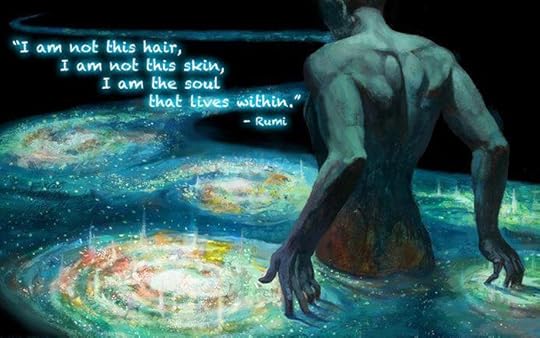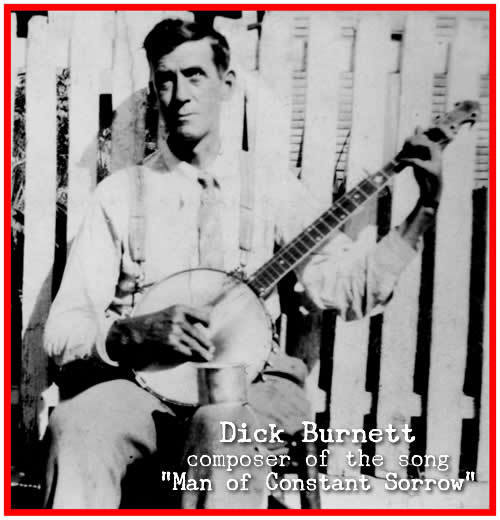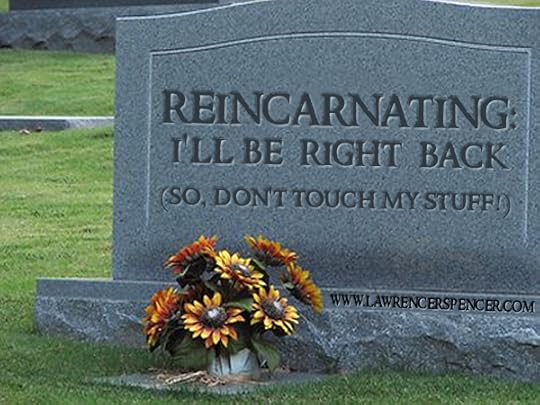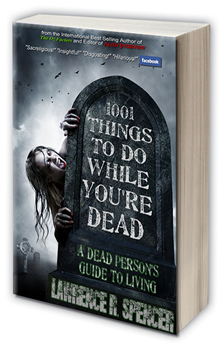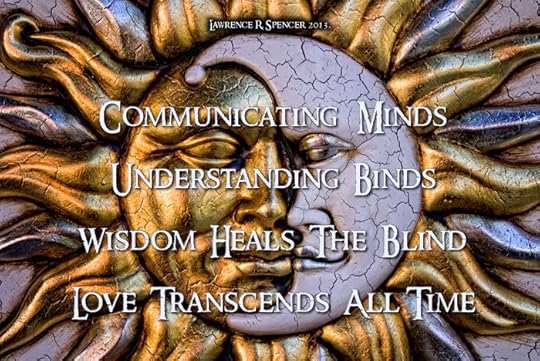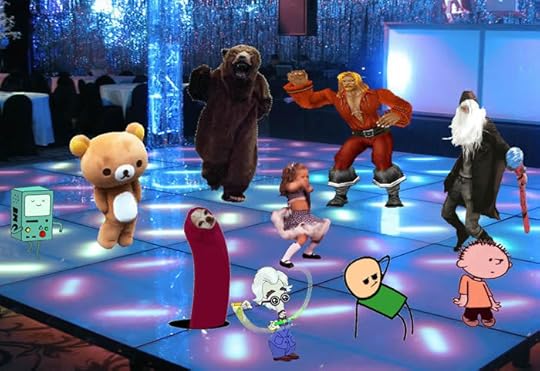Lawrence R. Spencer's Blog, page 545
August 28, 2013
WITHIN
MAN OF CONSTANT SORROW
MAN OF CONSTANT SORROW is one of my favorite songs. It communicates the very real pain that all of the citizens of our Earthly prison experience, to a greater or lesser degree. The song was originally recorded by Burnett as "Farewell Song" printed in a Richard Burnett songbook, c. 1913.
Written by Richard (Dick) Burnett (October 8, 1883 – January 23, 1977) was an American folk songwriter from Kentucky. Burnett was born near Monticello, Kentucky. He was known to play the banjo and guitar and was blind in one eye. Burnett allegedly wrote the traditional American folk song, Man of Constant Sorrow, which was later to be covered by Bob Dylan. He recorded with fiddler Leon Rutherford for Columbia Records. An early version was recorded by Emry Arthur in 1928.
Here is the link to listen to this version of the song on YouTube:
http://www.youtube.com/watch?v=d70uxe9FCls&feature=share&list=TLhR46lYtLp_E
The following are subsequent “covers” of the song:
Roscoe Holcomb (cover) -- http://youtu.be/1cJRRc8FToQ
Roscoe Holcomb, (born as Roscoe Halcomb[1] September 5, 1912 – died February 1, 1981) was an American singer, banjo player, and guitarist from Daisy, Kentucky. A prominent figure in Appalachian folk music
BOB DYLAN (cover) -- http://youtu.be/xCipKmyngLY
JOAN BAEZ (cover) -- http://youtu.be/nQQjBjwe3-s
Ralph Stanley (Solo version (cover)) http://youtu.be/fLKltv26-00
Stanley Brothers (cover) http://youtu.be/ldnZnjGBGXw
BLUEBERRY SMOKE (cover) -- http://youtu.be/SFhFiLmzIpk
Soggy Bottom Boys (from the film “Oh, Brother Where Art Thou” http://youtu.be/YZtgZ5fHOuU
Original Lyrics to “Farewell Song” (Man of Constant Sorrow)
I am a man of constant sorrow,
I've seen trouble all of my days;
I'll bid farewell to old Kentucky,
The place where I was born and raised.
Oh, six long year [sic] I've been blind, friends.
My pleasures here on earth are done,
In this world I have to ramble,
For I have no parents to help me now.
So fare you well my own true lover,
I fear I never see you again,
For I'm bound to ride the Northern railroad,
Perhaps I'll die upon the train.
Oh, you may bury me in some deep valley,
For many year [sic] there I may lay.
Oh, when you're dreaming while you're slumbering
While I am sleeping in the clay.
Oh, fare you well to my native country,
The place where I have loved so well,
For I have all kinds of trouble,
In this vain world no tongue can tell.
Dear friends, although I may be a stranger,
My face you may never see no more;
But there's a promise that is given,
Where we can meet on that beautiful shore.
________________________________________________
Dick Burnett Biography on Wikipedia.org
Burnett was born near Monticello, Kentucky. He was known to play the banjo and guitar and was blind in one eye. Burnett was born near the end of the nineteenth century on October 8, 1883, in the area around the head of Elk Springs, about seven miles north of Monticello. He remembered little of his farming parents. His father died when he was only four and his mother died when he was twelve. Burnett did say that his mother told him how his father would carry him in his arms when he was only four years old and he would help his dad sing. It is notable that Burnett's grandparents were of German and English descent and that particular ancestral influence would be instrumental in forming Burnett's musical career. At seven-years-old, Burnett was playing the dulcimer; at nine he was playing the banjo, and at thirteen he had learned to play the fiddle.
Richard Burnett's life took a drastic turn in early adulthood when he was attacked by a robber, shot in the face, and lost his eyesight. He was working in the oil field of central Kentucky, married with a young child, and now faced an uncertain future. Almost prophetically, his boss made the following statement to Burnett: "Well, you can still make it; you can make it with your music."
In time, Burnett joined forces with a young fourteen-year-old orphaned boy from Somerset. That young boy, Leonard Rutherford, would become Burnett's student and became one of the "smoothest" fiddle players known to come from Kentucky.
Richard Burnett, "blind minstrel of Monticello" and Leonard Rutherford, "one of the smoothest fiddlers ever to take a bow," soon were singing at every opportunity. They appeared on courthouse lawns and on the street playing and singing their music. In order to earn some money, Richard would strap a tin cup to his knee to collect the contributions from a satisfied crowd.
They traveled by bus, Model A, and on foot to any place they could and sing. From about 1914 until 1950, the pair became so popular that they found themselves in the company of most all the popular mountain musicians of the time. They were "at home" in the presence of greats like the Carter Family, Charlie Oaks, Arthur Smith, and many others. They appeared at the Renfro Valley Barn Dance, on radio stations in Cincinnati, and finally, they would be some of the first old-time musicians to enter the recording studios.
Burnett and Rutherford made their first commercial recording in 1926 for Columbia Records in Atlanta, Georgia. "They gave us sixty dollars a record and paid all our expenses from here to Atlanta and back, hotel bills and everything," Burnett reminisced. This unique banjo-fiddle-playing team, at times joined by banjoist W.L. Gregory and his fiddle-playing brother Jim, also of Monticello, continued to record for Columbia (and Gennett as well), through 1930.
Many of the songs Burnett and Rutherford used in their performances were songs they had learned from others in the past. When Burnett was asked where he learned some the old songs he recorded, he indicated some of them came from "Negroes around playing old time music" in Wayne County. He mentioned "Bled Coffey here in town, he was a fiddler during the Civil War, and the Bertram boys here, Cooge Bertram was a good fiddler…..Yes sir, there were a lot of black men playing old-time music. Bled Coffey was the best fiddler in the country."
Burnett was a prolific songwriter as well as an instrumentalist. Possibly his most well known song is the popular "Man Of Constant Sorrow" that found notoriety in the movie, "O Brother, Where Art Thou." On one occasion when asked if he wrote the song, Burnett replied: "No, I think I got that ballet from somebody—I dunno. It may be my song….."
It has been correctly observed about Richard Burnett: "He was a valuable link to country music's folk past and was a repository of material which he had both preserved and rewritten: "Pearl Bryan," "Short Life of Trouble," "Weeping Willow Tree," "Little Stream of Whisky," and many other ballads known to all folk revivalists." The team certainly deserves the title of "one of the most colorful and rewarding groups of the 1920s."
Richard Burnett died in Somerset, Kentucky on January 23, 1977, probably without ever realizing the great influence he had in the field of old-time Appalachian music.
August 26, 2013
IS-BE

"Personally, it is my conviction that all sentient beings are immortal spiritual beings. This includes human beings. For the sake of accuracy and simplicity I will use a made-up word: "IS-BE". Because the primary nature of an immortal being is that they live in a timeless state of "is", and the only reason for their existence is that they decide to "be".
No matter how lowly their station in a society, every IS-BE deserves the respect and treatment that I myself would like to receive from others. Each person on Earth continues to be an IS-BE whether they are aware of the fact or not."
-- Airl (Officer, Pilot and Engineer of The Domain Expeditionary Force). Excerpted from the book ALIEN INTERVIEW
August 25, 2013
DON’T TOUCH MY STUFF!
(Excerpt from the book 1,001 THINGS TO DO WHILE YOU'RE DEAD: A Dead Person's Guide To Living )
"VISIT A MATERNITY WARD.
If you finally change your mind and decide to go back to being a baby again, your best chances of getting a new baby body are at a maternity ward. Find a hospital building. Locate the newborn baby section. You may have to wait for a body that is not already occupied, or one that isn’t quite ready to hatch yet. This could take a while.
Or, you may be able to get one sooner by fighting off all the other disembodies beings who are hanging around the hospital trying to get a body for themselves. Why do you think babies cry and sleep so some much when they’re born? They had to kick a lot of disembodied asses to get a body. That’s why they are usually tired and cranky and have bruises, messy hair and blotchy skin!
REINCARNATE YOURSELF AS AN ANIMAL.
Theoretically, you can go back to Earth and inhabit the body of a human being. And, just as theoretically, you can go back to Earth an inhabit the body of a different kind of life form. This could be an interesting interlude.
Many small animals don’t live a long time, like rats and small birds. So, you might enjoy a short excursion as a creature of some kind. There are millions of species to choose from on land, in the air and in the oceans.
For convenience, here is a list of the Top 10 longest lived animals: rabbits – 28 years, bird-eating spiders – 28 years, dog – 29 years, cats – 38 years, goldfish – 43 years, horses – 62 years, birds – 60 to 118 years, elephants – 86 years, Koi fish – 226 years, Tortoise – 255 years!
If you decide to inhabit the body of a different life form you might want to consider their life style and eating habits before you choose.
For example, cats eat rats and mice. That could take some getting used to…. Some birds eat seeds, raw fish, frogs, bugs, garbage and road kill.
Silverback gorillas eat vegetation and they are strong enough to tear a man’s arms and legs off easily. Whales eat plankton, krill, squid, octopus and jellyfish. Dolphins are a fun species. They eat whole, raw fish – guts and all.
Anyway, there are a lot of options. Of course, human beings have been known to eat just about everything under the sun – including ALL of the items AND the animals listed above."
PREVIEW and BUY THE BOOK ...BEFORE IT'S TOO LATE! 
![1001 Things to Do While You're Dead | [Lawrence Spencer]](https://i.gr-assets.com/images/S/compressed.photo.goodreads.com/hostedimages/1381985472i/5512720.jpg)
AUDIOBOOK -- (UNABRIDGED) by Lawrence Spencer, Narrated by Kendra Hoffman
August 23, 2013
SPIRIT FRIENDS
August 22, 2013
IMAGINATURE
"The tree which moves some to tears of joy is in the eyes of others only a green thing that stands in the way.
Some see Nature all ridicule and deformity ...and some scarce see Nature at all.
But to the eyes of a man of Imagination, Nature is Imagination itself." -- William Blake
( Read more Quotations from William Blake ) http://www.brainyquote.com/quotes/authors/w/william_blake.html
________________________
William Blake (28 November 1757 – 12 August 1827) was an English poet, painter, and printmaker. Largely unrecognised during his lifetime, Blake is now considered a seminal figure in the history of the poetry and visual arts of the Romantic Age. His prophetic poetry has been said to form "what is in proportion to its merits the least read body of poetry in the English language". His visual artistry led one contemporary art critic to proclaim him "far and away the greatest artist Britain has ever produced".
Blake embraced the imagination as "the body of God", or "Human existence itself".
Considered mad by contemporaries for his idiosyncratic views, Blake is held in high regard by later critics for his expressiveness and creativity, and for the philosophical and mystical undercurrents within his work. His paintings and poetry have been characterised as part of the Romantic movement and "Pre-Romantic", for its large appearance in the 18th century. Reverent of the Bible but hostile to the Church of England – indeed, to all forms of organised religion – Blake was influenced by the ideals and ambitions of the French and American revolutions and he maintained an amiable relationship with Thomas Paine.
( below: a painting by William Blake, "Ancient of Days" )
August 21, 2013
THE MAGIC
The word "magic" derives via Latin magicus from the Greek adjective magikos (μαγικός) used in reference to the "magical" arts of the Persian Magi, or priests of Zoroaster, the god Ahura Mazda.
Dictionary definitions of "magic":
1) having or using special powers to make impossible things happen or seem to happen
2) having a special quality that makes something seem wonderful
3) Wonderful, amazing or incredible.
Etymology: magic (n.) from Old Persian magush, "to be able, to have power".
THE GREATEST MASSACRE
 Order a copy of this map from http://tribalnationsmaps.com/
Order a copy of this map from http://tribalnationsmaps.com/
"The greatest massacre in history was wrought not with armor-plated soldiers wielding weapons of steel, or even with the clumsy flintlock muskets of the Conquistadors. Europeans possessed an unlimited arsenal of biological warfare weapons acquired through many generations of prohibition against the practice of bathing. Taking a bath in the 1400s was forbidden by the Christian Church as protest against the public baths so popular in the "pagan" Roman Empire.
Biological weapons were carried in the bodily filth of each and every soldier, sailor and priest who landed in the New World. Billions of unseen little soldiers--the bacilli of bubonic plague, yellow fever, malaria, cholera, small pox, diphtheria, measles, influenza, and legions of other unseen, unsuspected, unstoppable bacteria attacked the native inhabitants of the New World.
Like the terrifying science fiction story by HG Wells, "War of the Worlds", the Conquistadors were real life invaders from an alien universe who effortlessly devastated the people of the New World. If a race of alien beings actually landed on Earth from a distant solar system or galaxy, it is quite conceivable that the fate of mankind would be sealed, not by military conquest, but by single-cell life forms carried on the skin or in the lungs of the other-worldly invaders.
Approximately 20 consecutive waves of pestilence swept the American Continents between 1492 AD and 1600 AD. Disease killed nine out of every ten people. By the year 1600 AD, it is estimated that 90 percent of the 100 million native inhabitants living in the Americas had died of diseases carried to them by the alien invasion forces of Europe!
Imagine what would happen to our current civilization if nine out of every ten people were to die of disease within the next 100 years?"
-- Excerpt from the book THE OZ FACTORS, by Lawrence R. Spencer.

